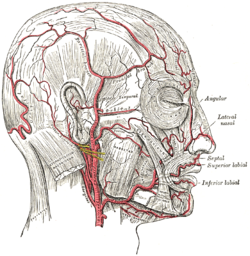Giant cell arteritis

Editor-In-Chief: Prab R Tumpati, MD
Obesity, Sleep & Internal medicine
Founder, WikiMD Wellnesspedia &
W8MD's medical weight loss NYC, sleep center NYC
Philadelphia medical weight loss and Philadelphia sleep clinics
| Giant cell arteritis | |
|---|---|
 | |
| Synonyms | Temporal arteritis, cranial arteritis |
| Pronounce | |
| Specialty | Rheumatology |
| Symptoms | Headache, jaw claudication, vision loss, scalp tenderness, fever, fatigue |
| Complications | Blindness, aortic aneurysm, stroke |
| Onset | Typically >50 years old |
| Duration | |
| Types | |
| Causes | Unknown, possibly autoimmune |
| Risks | Polymyalgia rheumatica, age >50, female sex |
| Diagnosis | Temporal artery biopsy, ultrasound, MRI |
| Differential diagnosis | Polymyalgia rheumatica, Takayasu's arteritis, migraine, tension headache |
| Prevention | |
| Treatment | Corticosteroids, methotrexate, tocilizumab |
| Medication | |
| Prognosis | Good with treatment, risk of complications if untreated |
| Frequency | 15-30 per 100,000 people over 50 years old |
| Deaths | Rare with treatment |
Giant cell arteritis (GCA), also known as temporal arteritis and cranial arteritis, is an inflammatory disease of blood vessels. Most commonly, it affects the arteries of the head, especially those in the temples. For this reason, it is often called temporal arteritis. If the disease is not treated, it can lead to blindness or stroke.
Symptoms[edit]
The most common symptoms of giant cell arteritis are head pain and tenderness — often severe — that usually affects both temples. Other signs and symptoms, which can occur suddenly, include:
- Pain and stiffness, often in the neck, shoulders or hips
- Fatigue
- Loss of appetite
- Fever
- Unintended weight loss
- Vision loss or double vision, particularly in one eye
- Scalp tenderness
- Jaw pain or jaw claudication
- Sweating
- Joint pain
- Muscle pain
Causes[edit]
The exact cause of giant cell arteritis is unknown. It is thought that a combination of genetic and environmental factors, such as infections, play a role. The condition is related to an abnormal immune response.
Diagnosis[edit]
Diagnosis of giant cell arteritis can be difficult because the symptoms are similar to those of other conditions. However, a biopsy of the temporal artery can confirm the diagnosis. Other tests, such as blood tests and imaging studies, may also be used.
Treatment[edit]
Treatment for giant cell arteritis involves high doses of a corticosteroid drug such as prednisone. Because of the risk of vision loss, treatment typically begins as soon as the disease is suspected, even before a diagnosis is confirmed.
Prognosis[edit]
With early diagnosis and treatment, the prognosis for people with giant cell arteritis is generally good. However, relapses are common and long-term medication may be needed.
See also[edit]
References[edit]
<references />
Ad. Transform your life with W8MD's Budget GLP-1 injections from $49.99


W8MD offers a medical weight loss program to lose weight in Philadelphia. Our physician-supervised medical weight loss provides:
- Weight loss injections in NYC (generic and brand names):
- Zepbound / Mounjaro, Wegovy / Ozempic, Saxenda
- Most insurances accepted or discounted self-pay rates. We will obtain insurance prior authorizations if needed.
- Generic GLP1 weight loss injections from $49.99 for the starting dose of Semaglutide and $65.00 for Tirzepatide.
- Also offer prescription weight loss medications including Phentermine, Qsymia, Diethylpropion, Contrave etc.
NYC weight loss doctor appointmentsNYC weight loss doctor appointments
Start your NYC weight loss journey today at our NYC medical weight loss and Philadelphia medical weight loss clinics.
- Call 718-946-5500 to lose weight in NYC or for medical weight loss in Philadelphia 215-676-2334.
- Tags:NYC medical weight loss, Philadelphia lose weight Zepbound NYC, Budget GLP1 weight loss injections, Wegovy Philadelphia, Wegovy NYC, Philadelphia medical weight loss, Brookly weight loss and Wegovy NYC
|
WikiMD's Wellness Encyclopedia |
| Let Food Be Thy Medicine Medicine Thy Food - Hippocrates |
Medical Disclaimer: WikiMD is not a substitute for professional medical advice. The information on WikiMD is provided as an information resource only, may be incorrect, outdated or misleading, and is not to be used or relied on for any diagnostic or treatment purposes. Please consult your health care provider before making any healthcare decisions or for guidance about a specific medical condition. WikiMD expressly disclaims responsibility, and shall have no liability, for any damages, loss, injury, or liability whatsoever suffered as a result of your reliance on the information contained in this site. By visiting this site you agree to the foregoing terms and conditions, which may from time to time be changed or supplemented by WikiMD. If you do not agree to the foregoing terms and conditions, you should not enter or use this site. See full disclaimer.
Credits:Most images are courtesy of Wikimedia commons, and templates, categories Wikipedia, licensed under CC BY SA or similar.
Translate this page: - East Asian
中文,
日本,
한국어,
South Asian
हिन्दी,
தமிழ்,
తెలుగు,
Urdu,
ಕನ್ನಡ,
Southeast Asian
Indonesian,
Vietnamese,
Thai,
မြန်မာဘာသာ,
বাংলা
European
español,
Deutsch,
français,
Greek,
português do Brasil,
polski,
română,
русский,
Nederlands,
norsk,
svenska,
suomi,
Italian
Middle Eastern & African
عربى,
Turkish,
Persian,
Hebrew,
Afrikaans,
isiZulu,
Kiswahili,
Other
Bulgarian,
Hungarian,
Czech,
Swedish,
മലയാളം,
मराठी,
ਪੰਜਾਬੀ,
ગુજરાતી,
Portuguese,
Ukrainian


